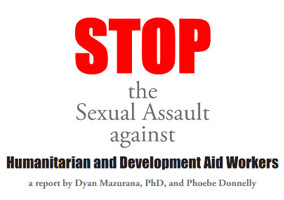Zero tolerance is a “nice phrase” but it can actually act as a disincentive to complaints about sexual harassment in the workplace, charities were told yesterday.
Dr Diane Chilangwa Farmer, trustee at Concern Worldwide, chaired a panel discussion titled #AtWhatCost: Tackling sexual harassment and misconduct in the charity sector, at Civil Society Media’s People and Culture Conference yesterday.
One panel member, Ruby Bayley-Pratt, policy and research manager at the British Red Cross, said power dynamics were at the centre of the issue of sexual harassment.
She added that it is something happening across the whole of society, but because staff in the sector “care about the charity”, it can be "very hard to report and to take action”.
Meanwhile, Caoileann Appleby, project leader of Rogare's Gender in Fundraising group, said that in the charity sector “we like to pat ourselves on the back” but “we do no better, really, than any other sector''.
“Awareness raising is not enough; awareness is nothing without action,” she said.
Zero tolerance: People might be afraid to speak out
Appleby said reporting was a major issue, she said: “We can have all the policies and procedures we like but if we are not comfortable as a sector with reporting issues when they come, we cannot tackle them.”
She added that “what too often happens is that the policies centre the organisation”, aiming to protect its reputation rather than that of the actual person.
She explained: “Zero tolerance is a nice phrase but sometimes it can actually be a disincentive to report”, and can “mean different things to different people”. This means that using the phrase can “take away that flexibility and it can put people off reporting”.
This is because some people “do not want to cause a fuss” and garner negative attention at work. Instead they just want the behaviour to stop.
She added that a person might think they will be “punished for speaking up” or that “the other person might get fired and everybody is going to know why and blame them”.
Dr Shola Mos-Shogbamimu, founder and editor-in-chief of the publication Women in Leadership, said there are different factors which affect the likelihood of someone making a complaint. She said there was “an imbalance in the complexities around the experiences of those who are being abused. It has not been deconstructed in the right way”.
Acting on principles: 'You have to make a stand'
Ann Kiceluk, executive director at the RSPB, said “HR has an incredibly powerful role” in helping change behaviours and attitudes in the workplace.
On sexual harassment, she said senior people need to be “calling it out”. It cannot “just be a policy on the shelf - it is absolutely unacceptable behaviour”.
Kiceluk gave an example of when “principles have to come into action”, where RSPB directors had signed a statement which said they would not sit on all-male panels.
She said the CEO had been asked to speak at an event where the panel were all men, but they were able to change some of the speakers through making RSPB’s position clear.
She added that “there is no point in having the principle” if when it gets “inconvenient” people abandon it. “You have to make a stand.”
|
Related articles











